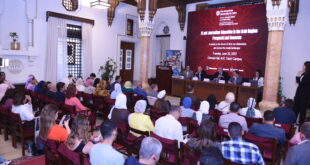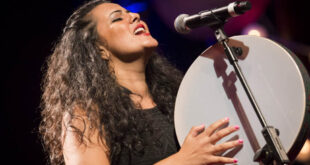Moller Centre, Churchill College, Cambridge, UK
28-30 September 2004
Does transnational broadcasting media impact political change in the Arab world, and if so, in what way and to what extent? This question lies at the heart of the ongoing discourse about Arab satellites and their role in opening and defining a new public sphere in the Middle East. It is a particularly salient subject for a conference as the Middle East confronts a controversial series of reform initiatives aimed at "democratizing" the region. Ranging from the American-led "Greater Middle East" plan to the counter-proposal introduced by the Arab summit in Tunis 2004 and other, more local, calls for liberalization from domestic opposition parties and activists, these initiatives and the heated discussion surrounding them have once again brought satellites to the fore, both as forums for, and subjects of, the debate over reform. The Cambridge Arab Media Project's conference in September 2004, held in partnership with the Centre for Middle Eastern and Islamic Studies at Cambridge University, brought academics and analysts together with media professionals to address the crucial question of transnational satellite broadcasting's role in inducing and influencing political change in the Arab world.
The novelty of Arab satellites may be wearing off, but as channels like Al Jazeera, MBC, and Iqra settle into relative maturity, they are joined by more and more stations competing for audiences and market space in a crowded and vibrant broadcasting milieu. In this context, the early excitement about transnational broadcasting technologies as platforms for free speech has begun to settle into a more complex picture. The Cambridge conference reflected this by revealing a schism between those who still believe in the optimistic promise that a relatively "free" transnational Arab media would encourage pluralism, democratic ideals, pan-Arabism, and pan-Islamism; and those who have become disillusioned with the idea that the Arab satellites-many of them state-owned or owned by people with close ties to the state-are truly independent and effective tools for meaningful debate and reform. In the absence of a large body of reliable statistics, fieldwork results, data on viewership patterns, and audience opinion surveys that might enable observers to judge how the effects of satellite programming manifest themselves in the streets and in people's hearts and minds, much of the discussion took on an air of general speculation and self-examination that reflected some of the challenges and pitfalls faced by both practitioners and students of media in the Arab world.
The question of media's democratizing and unifying potential was a central and recurring theme at the conference, as in discourse about transnational broadcasting in general. Participants had difficulty pointing to any clear cause-and-effect case when a satellite broadcast or television show had had a direct impact on political structures in the Arab world, but Saad Eddin Ibrahim pointed out during his remarks on the first day of the three-day conference that the issue may be better framed as a question of whether Arab satellites are helping to create an "atmosphere" of pluralism. Arab satellite broadcasting (ASB), he argued, may have a "latent" impact by providing a long-term basis for reform and raising political, nationalistic or democratic awareness in the Arab world. Al Jazeera's Faisal Al-Kasim agreed, and suggested in his own presentation that transnational broadcasting is reviving Pan-Arabism and Pan-Islamism by raising Arab self-consciousness, sense of identity, and feelings of solidarity. "The great contribution of ASB is bringing in other views-that the Arab is being exposed to diversity," Ibrahim said. "In time that will bring about change."
Certainly, there is no denying that Arab satellite programs have broken taboos, broached issues that were formerly considered off-limits, and raised Arab and Muslim consciousness about conflicts in Palestine and Iraq. And although channels like Al Jazeera and Al Arabiya are dependent on the state and state actors for funding, governments and rulers also are dependent on the channels for credibility and influence in the region. If Arab satellite channels need state support to survive, it may also be that states need Arab satellites too.
But does the sensationalist, sound-bite culture of the television medium itself run counter to the educational and liberalizing goals expressed by hopeful voices like Al-Kasim's and Ibrahim's? Do political debate shows like Al-Ittijah Al-Mu'akis (The Opposite Direction), which Al-Kasim presents on Al Jazeera, serve as crucial forums for open discussion and platforms that allow non-state actors and marginalized voices to compete with formal spokespeople and government officials? Or are such programs merely, in the end, a venting mechanism, tolerated by the regimes that fund them because they distract from meaningful, in-depth debate and substitute for the implementation of real change on the ground while giving audiences and journalists alike the illusion of openness and freedom? It may be that television is an entertainment medium at heart; one that, as Al-Kasim himself put it, loves "spectacle" and naturally gravitates there. Conference organizer and speaker Khaled Hroub argued in his paper "Arab (Media) Intellectuals: Challengers or Accommodators" that despite having access to an unprecedented mass audience for their views, Arab intellectuals on satellite TV lapse into shouting matches and defensiveness instead of critical thinking. "Most of them lack the courage to use this medium to critically challenge the socio-cultural or political status quo that they live in," he argued. Another conference speaker, Ibrahim Helal of the BBC Monitoring Group, agreed that "freedom of speech doesn't change the situation on the ground," and warned that merely venting Arab anger through satellite TV may be dangerous. In another paper titled "Arab Satellite Broadcasting: Democratizing or Radicalizing, Liberal or Patriarchal?" Muhammad Ayish urged a long-term historical perspective: "ASB is shrouded in a lot of mythology," he said. "We should admit satellite broadcasting in the Arab world has its limits. It's not fair to raise expectations. Democratic transition takes time."
The conference also featured much honest discussion about the constraints faced by satellite TV reporters. Palestinian writer Abbas Shiblak pointed out that Arab politicians, while represented on satellite TV by spokesmen and government officials, are never present themselves to respond to real people's questions or give interviews. Helal and others lamented the absence of in-depth reports on local news or investigations into Arab domestic politics, while Naomi Sakr's paper, "Arab Satellite Broadcasting and the State: Who Curbs Whom, How and Why?" concluded that "curbs are more one-way (state curbs on broadcasters) than two-way, and that any evidence that appears to indicate media curbs on the state needs to be assessed in a wider context." Meanwhile, speaking from the perspective of a media professional, Dubai TV's Jasim Al-Azzawi complained about restrictions imposed by "unwritten laws" which do not allow broadcasters or their guests to challenge the existence of God or attack the integrity of any king or president. "We do not have enough protection to do good journalism," he said. "…There is no investigative journalism about corruption. We all know why. Because you'll end up in jail." People do not become activists from watching TV, he argued. There are other reasons for that. But he did agree that Arab satellite broadcasting has heightened awareness among Arab viewers. The implications of this increased "awareness" remained a subject of debate throughout the conference. Ibrahim acknowledged that so far such awareness has not channeled itself into a movement that is changing political structures in the Arab world. Satellite TV's contribution to a public sphere does, however, contribute to pluralism in a region with a history of state media monopoly, and this must not be overlooked as a source of hope, he said. "You have a choice of dying in silence or screaming out," he added. "Even a venting mechanism is good. Everything starts with an idea."
However, the conference's tendency to focus on the news media, especially Al Jazeera, at the expense of the vast majority of entertainment and religious programming on satellite TV reflects a perhaps unfortunate tendency among observers and analyzers of Arab media to over-stress news programming when it is only a fraction of the satellite viewing experience in the Middle East. Although the importance of Al Jazeera, Al Arabiya, and other news outlets cannot be denied and forms a natural focus for a conference on Arab politics and the media, Naomi Sakr made a good point during a question-and-answer session when she said, "It's a mistake to think entertainment is not political. The personal is political." A few exceptions to this tendency to focus on news programming were Shereen Abou Al-Naga's paper on the image of women in music videoclips, and Lindsay Wise's paper on Islamic television preacher Amr Khaled.
ASB's relationship with the West added another dimension to the conference. US Ambassador Mark Hambley, director of the Media Outreach Center in London, presented "Official Western Views of ASB," a paper that stressed America's support for the free speech opportunities represented by the Arab satellite channels, while also outlining objections to what the US government considers misleading, inaccurate, and biased reporting by Al Jazeera. (He was more positive about Al Arabiya's record.) In the same session, Jon Alterman, director of the Center for Strategic and International Studies in Washington, D.C., reversed the question with his paper "Occidentalism: the West on ASB," arguing that the "effect of superficial knowledge producing stereotypes and distrust (on Arab satellite TV) is paralleled almost precisely by the effects of many Western media portrayals of the Arab world."
Unfortunately, the conference did not have time to hold a concluding session, and as a result, many loose ends remained untied at the end of the proceedings, and participants did not have much opportunity to try to reach consensus or summarize the main findings of the conference. A few issues did stand out, however. There were repeated calls for more content-based research, as well as fieldwork and surveys to help assess the impact of satellite programming on Arab audiences. Shibley Telhami, who gave the keynote address, touched on a key stumbling block in the field when he described the difficulty of obtaining reliable polling data on viewership patterns and audience attitudes in the Arab world because survey work is severely restricted by security-minded regimes. For his own research, Telhami had to sneak political questions into marketing research, and even then his samples were relatively limited.
In addition, Hroub urged participants to think about the need for a universal Code of Ethics to help satellite channels define key principles such as "objectivity" and "credibility," and make tough decisions like whether to air graphic war footage or hostage videos. While no formal rules were proposed during the conference, there was general consensus that satellite coverage should err on the side of caution and respect for viewers as well as for victims of violence and their families. Iqbal Qazwini, Hani Al-Masri from Al-Ayyam newspaper in Palestine, and Ehab Bessaiso from the University of Cardiff made the case that insensitive saturation coverage of the Palestinian and Iraqi conflicts may lead to the desensitization of viewers and the stereotyping of Palestinians and Iraqis as victims and martyrs rather than as human beings in a local, day-to-day context. They called for more in-depth and humanizing documentaries that would portray the conflicts respectfully and in all their complexities
The conference's greatest strength was also a weakness: In bringing together academics and media professionals, the Cambridge Arab Media Project offered both theorists and practitioners an invaluable opportunity to hear from each other and exchange ideas and perspectives. On the other hand, it also runs the risk of leaving participants dangling in an indistinct middle ground between theory and practice, trapped in the chicken-before-the-egg conundrum of what it means to have freedom of expression without democracy. Most participants, however, agreed that while it was too much to ask Arab satellite broadcasting to adopt a democratic agenda, there is no question that it enables, for good or for ill, more voices to enter the politicized arena of the public sphere.
 Arab Media & Society The Arab Media Hub
Arab Media & Society The Arab Media Hub




